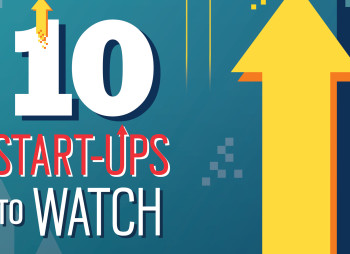Keep reading for our complete list of 25. The companies aren’t ranked. We’re presenting them in alphabetical order and we’re including links to more in-depth posts on 10 startups on the list.
BitSight Technologies
Founders: Stephen Boyer, Nagarjuna Venna;
Equity raised: $95 million;
Estimated 2016 revenue: $30 million;
Key investors: Globespan Capital Partners, Menlo Ventures, GGV Capital
What it does: Uses complex algorithms to produce a daily security rating that is akin to a credit score for cyber-security. Since its 2011 founding, it has signed up more than 450 companies, including Ferrari, Hess and Lowe’s. It’s based in Cambridge, MA.
Boxed
Founders: Chieh Huang, Jared Yaman, Christopher Cheung, William Fong;
Equity raised: $133 million;
Estimated 2016 revenue: More than $100 million;
Key investors: DST Global, GGV Capital
What it does: Offers direct delivery of bulk-sized packages that its customers order via app or online. Since opening in a suburban New Jersey garage in 2013, the New York-based company has increased revenue to more than $100 million this year from $8 million two years ago. “Consumer packaged goods are one of the biggest drivers of the economy, and are only 1.5% online,” says CEO Huang, 35. “How crazy is that?”
Checkr
Founders: Daniel Yanisse and Jonathan Perichon;
Equity raised: $50 million;
Estimated 2016 revenue: $150 million;
Notable investors: Accel, Y Combinator
What it does: Sells background checks to the likes of Uber, Instacart and Warby Parker. San Francisco-based Checkr delivers its reports in the form of an API, or application programming interface, which connects to companies’ hiring system software. Founded in 2014, it already has more than 4,000 customers and 90 employees. Founders Yanisse, 28, and Perichon, 26, are natives of France who got the idea for Checkr while working at Deliv, an on-demand delivery service in Palo Alto, where they had to run background checks. “I was really struck by how bad their technology and user interface was,” says Yanisse. “I thought, we can do better than that.”
ClassPass
Founders: Payal Kadakia, Mary Biggins, Sanjiv Sanghavi;
Equity raised: $84 million;
Estimated 2016 revenue: $180 million;
Key investors: Google Ventures, General Catalyst Partners, Thrive Capital
What it does: Allows subscription customers to sign up for unlimited classes in everything from Pilates, cycling, boxing and boot camps to aerial yoga, pole dancing and underwater spinning via an app. Now in 31 U.S. cities and eight others across the U.K., Canada and Australia, the model has proven immensely popular, with more than 20 million classes booked to date. CEO and cofounder Kadakia, 33, a classically trained Indian dancer and MIT grad, got the idea for the company in 2010 after spending hours online searching for a good dance class in New York City. She launched ClassPass in New York in 2013.
Collective Health
Founders: Ali Diab and Rajaie Batniji;
Equity raised: $150 million;
Estimated 2016 revenue: $15 million;
Notable investors: Founders Fund, Google Ventures
What it does: Processes health claims for self-insured companies. The three-year-old San Francisco-based company provides customers with data and insights that help them optimize their health plans. It also sells customer service and software that explain benefits clearly, make filing for insurance claims easy and reimburse patients within days instead of weeks. And it tracks the latest treatments, like advances in chemotherapy, which means it rejects far fewer claims than conventional insurers, says CEO and cofounder Ali Diab, 43, who had worked as a product manager at Yahoo and mobile advertising company AdMob. He got the idea for Collective Health after emergency surgery for a twisted small intestine left him with $200,000 of denied claims. “The user experience was insultingly bad,” he says. Cofounder Rajaie Batniji, 35, is an assistant professor of internal medicine at Stanford Hospital.
Doppler Labs
Founders: Noah Kraft, Fritz Lanman;
Equity raised: $50 million;
Estimated 2017 revenues*: $100 million;
Key investors: Acequia Capital, The Chernin Group, Wildcat Capital Management
What it does: Makes a miniature computer for your ears that it hopes will become as ubiquitous as the iPhone. Its new device, called Here One, which Doppler is preselling for $299, allows wearers to get information (play-by-play commentary during a baseball game, for example), adjust noise (for sleep or to hear better) and generally augment aural reality. “We want to put a computer in every ear,” says CEO Kraft, 29.
Freshdesk
Founders: Girish Mathrubootham;
Equity raised: $95 million;
Estimated 2016 revenue: $65 million;
Notable investors: Accel, Tiger Global Management, Google Capital
What it does: Sells cloud-based customer support software that allows companies to reach their patrons through lots of channels, including email, phone, websites, forums and social media. Customer service reps log into a Freshdesk dashboard where tickets are created for emails and chat requests. The company also sells Freshservice, which handles a company’s internal customer support. Freshdesk was founded in Chenai, India, six years ago by CEO Mathrubootham, 42, after his television broke during a move from India to the U.S. and the mover ignored his complaints. He griped in an online forum and finally got a response. Freshdesk is competing with bigger rivals like Zendesk by focusing on small and medium-sized businesses around the world. Based in San Bruno, CA, Freshdesk has 850 employees worldwide, with offices in Chenai, Berlin, London and Sydney.
Fuze
Founders: Steve Kokinos, Derek Yoo;
Equity raised: $200 million;
Estimated 2016 revenues **: More than $150 million;
Key investors: Bessemer Venture Partners, TCV, Summit Partners
What it does: Helps enterprises consolidate their communications, whether voice, video or messaging, in the cloud. For companies, gathering together these disparate methods has been a big deal, and it’s not easy to do. “There are many applications that people use even though user experience is terrible,” says Steve Kokinos, 41, Fuze’s cofounder and chief executive. “Our idea from early on was that this is a complicated mess that does not help the end user.” When it was founded a decade ago in Cambridge, MA, it was first called ThinkingPhones.
Gigster
Founders: Roger Dickey and Debo Olaosebikan;
Equity raised: $12.5 million;
Estimated 2016 revenue: $30 million;
Notable investors: Andreessen Horowitz, Y Combinator
What it does: Offers a platform where companies hire heavily screened freelance software developers, designers and project managers. Two-year-old San Francisco-based Gigster takes 25% of the fee. Customers include IBM and MasterCard. Trained as a software engineer, Dickey, 33, founded a company when he was 23 that produced a popular multi-player social network game called Dope Wars, which he sold to Zynga in 2008. Cofounder Olaosebikan, 30, was a rapper in Lagos, Nigeria, where he founded two startups. Dickey and Olaosebikan met at a San Francisco meetup for people interested in a new technology called Meteor.
GoFundMe
Founders: Brad Damphousse and Andy Ballester;
Equity raised: At least $300 million;
Estimated 2016 revenue: $100 million
What it does: Runs the world’s largest and most successful crowdfunding site. Based in Redwood City, CA, it takes 5% of all funds raised for what it calls “personal causes,” after charging a 2.8% fee for credit card processing and .30 per donation. In its first five years, starting in 2010, it logged $1 billion in donations. Since a venture capital deal in July 2015 that valued the company at $600 million, it’s channeled nearly $2 billion.
Guardant Health
Founders: Helmy Eltoukhy and AmirAli Talasaz;
Equity raised: $200 million;
Estimated 2016 revenue: $30 million;
Notable investors: Khosla Ventures, Lightspeed Venture Partners, OrbiMed Advisors, Sequioa Capital
What it does: Offers a blood test to cancer patients who want to avoid the pain and risk of invasive tumor biopsies. The company’s “liquid biopsy,” on the market since 2014, makes use of DNA fragments from cancerous tumors that are present in a patient’s blood. The test monitors the progression of the disease and detects gene mutations that suggest which drugs should be used in treatment. Though dozens of other companies offer similar tests, CEO and cofounder Eltoukhy, 37, says that Guardant dominates the field with a 95% market share. Based in Redwood City, CA, it has a head count of 190 and growing. Guardant’s test has a $5,800 list price but the company negotiates with patients’ insurance plans.
HotelTonight
Founder: Sam Shank;
Capital raised: $81 million;
Estimated 2016 revenue: $60 million;
Notable investors: Coatue, Battery Ventures, US Venture
What it does: Offers last-minute hotel booking via mobile app or website. Sam Shank, 43, who founded the company five years ago in San Francisco, believes people want curated results of no more than 15 choices instead of 500. HotelTonight adds a markup of up to 20% to the discounted rates it gets from hotels in more than 2,500 cities and towns in North America and Europe. Shank is considering an IPO as early as next year. This is his third travel startup. In 2004 he founded hotel review site TravelPost, which he sold to travel site SideStep in 2006. Next came DealBase, a travel search engine that spun out HotelTonight.
InVision
Founders: Clark Valberg and Ben Nadel;
Equity Raised: $135 million;
Estimated 2016 revenue: $40 million;
Key Investors: FirstMark Capital, Tiger Global, Accel, Iconiq Capital
What it does: Sells software that makes it easy for designers to create prototypes for websites and apps that look like real products, without waiting for engineers to build back-end technology. After attracting a client roster that includes Airbnb, Lyft, Netflix, Salesforce and Twitter, InVision is targeting big banks and traditional companies who are putting more of a focus on design.
Mark43
Founders: Scott Crouch, Matthew Polega, Florian Mayr;
Equity raised: $41 million;
Estimated 2017 revenue*: Upwards of $15 million;
Key investors: General Catalyst Partners, Spark Capital
What it does: Helps police departments run more efficiently and effectively with software and data analytics. While it’s not easy getting police departments to change, Mark43 has signed up a handful of them, and recently won its first competitive bid to supply five departments in Los Angeles County. CEO Scott Crouch, 25, started the company with two buddies while he was in college at Harvard.
Opendoor
Founders: Eric Wu, Keith Rabois, JD Ross, Ian Wong;
Equity raised: $110 million;
Estimated 2016 revenue: More than $50 million;
Key investors: Access Industries, GGV Capital, Khosla Ventures
What it does: Provides a new way of buying and selling homes. Each year, 5.5 million Americans sell their homes, struggling with the brutal process of real-estate brokers and open houses and the uncertainty over just how long the deal will take to close. San Francisco-based Opendoor aims to change all of that, by using technology to come up with a price the home is worth, and buying it (taking an average 8% fee) just about on the spot.
Owlet Baby Care
Founders: Kurt Workman, Jordan Monroe, Zack Bomsta, Jacob Colvin;
Equity raised: $15 million;
Estimated 2016 revenue: $20 million;
Key investors: Azimuth Ventures, Eclipse, ff Venture Capital, Eniac Ventures
What it does: Makes baby health monitors. When Kurt Workman was a college student at Brigham Young University, he was starting to plan a family and worried about his unborn baby’s safety. So Workman, now 27, and his cofounders developed Owlet, a baby monitor that relies on pulse oximetry, a measure used in hospitals, to alert parents if their baby stops breathing or suffers a spike or drop in heart rate. The Owlet technology fits into a snuggly baby sock and sells to consumers for $250. “Owlet is not only the next car seat,” Workman says, “We believe it is the next thermometer and the next algorithm for infant care.”
Procore Technologies
Founders: Tooey Courtemanche;
Equity raised: $129 million;
Estimated 2016 revenue: $55 million;
Key investors: Bessemer Venture Partners, Iconiq Capital
What it does: Sells construction management software that helps contractors keep track of their projects, from drawings and spec books to overseeing subcontractors, online or via mobile phone, and lets them integrate their projects with accounting and scheduling software. Procore’s selling point to contractors: keep better tabs on projects and reduce errors and cost overruns.
Rubicon Global
Founder: Nate Morris;
Equity raised: $96 million;
Estimated 2016 Revenue: More than $300 million;
Key investors: Goldman Sachs, Wellington Management
What it does: Matches independent garbage haulers and recyclers with large companies like grocers, restaurant chains and hotels, using its technology to schedule on-demand pick-ups. Rubicon’s competitive bidding process and diversion of trash from landfills to recyclers lowers waste removal costs for customers. More than 5,000 businesses including Wegman’s and 7-11 have signed up. Rubicon is expanding to residential customers The Atlanta-based company was founded in 2008 by Morris, a native of Louisville who has been active in Republican politics as a fundraiser for George W. Bush and Senator Rand Paul.
Rubrik
Founders: Bipul Sinha, Arvind Jain, Soham Mazumdar, Arvind Nithrakashyap;
Equity raised: $112 million;
Estimated 2016 revenue: $50 million;
Key investors: Greylock Partners, Lightspeed Venture Partners
What it does: Sells software that makes it possible for companies to move and store terabytes of information between their on-site data centers and the cloud. Example: Its client Driscoll’s has masses of data on the genotypes and varieties of the berries it develops and cultivates. Rubrik helps Driscoll’s protect and store that data across the company’s global operations. If a server goes down, Rubrik can retrieve the data instantaneously. Based in Palo Alto, two-year-old Rubrik’s founders are alumni of Oracle, Google and Facebook and its CEO Bipul Sinha was a partner at Lightspeed Venture Partners, early investors in Snapchat.
Sumo Logic
Founders: Christian Beedgen, Kumar Saurabh;
Equity raised: $160 million;
Estimated 2016 revenue**: More than $50 million;
Key investors: Greylock Partners, DFJ Growth, IVP
What it does: Sells a cloud-based analytics service that delivers real-time insights. The Redwood City, CA-based company works with firms across multiple industries, including AirBnB, Anheuser-Busch, Land O’Lakes and Twitter, to help them make sense of digital data they otherwise would have likely ignored. Founded six years ago by two veterans of ArcSight, a cyber-security company acquired by Hewlett-Packard, today it’s run by Ramin Sayar, 44, who joined as CEO in 2014 from VMWare, a virtualization software company, with the goal of building the company. “I would classify Sumo as a tweener,” Sayar says. “We’re a little awkward and trying to figure things out, and that’s the most enjoyable time for a company.”
ServiceMax
Founders: David Yarnold, Athani Krishna, Hari Subramanian;
Equity raised: $204 million;
Estimated 2016 revenue: $60 million;
Key investors: Meritech Capital Partners, Premji Invest, Emergence Capital Partners
What it does: Automates the way field service workers like elevator repair people and oil rig workers do their jobs. Instead of responding to an appointment booked by phone, filling in a work order by hand, and waiting for the customer to send in a paper check, workers can use ServiceMax’s software to track equipment maintenance and manage schedules. It also records which parts are in stock and monitors problems as they arise on devices like CAT scan machines. When a machine needs service, the software sends out an alert. Two of the founders, Athani Krishna and Hari Subramanian, both 46, are natives of India who came to the U.S. to work as software engineers and started the company in Pleasanton, CA nine years ago. ServiceMax has some big competitors including SAP, Oracle and Salesforce but the worldwide market for field service work has been estimated at $18 billion. ServiceMax has offices in India, the U.K. and a dozen other countries.
Sisense
Founders: Eldad Farkash, Aviad Harell, Guy Boyangu, Adi Azaria;
Equity raised: $94 million;
Estimated 2016 revenue: $50 million;
Key investors: Bessemer Venture Partners, DFJ Growth
What it does: Sells business intelligence and analytics software that helps companies make sense out of huge swaths of data, ranging from manufacturing efficiency to inventory and sales numbers to warranty use and return levels. Clients include Motorola, General Electric, Target, Lockheed Martin and a range of small and medium-sized businesses. The company started in 2005 in Tel Aviv and now has offices in both Israel and New York. “It was five guys and a dog in a garage, dreaming about impossible technology,” says CEO Amir Orad, 41. In 2010 they launched the software and since then, says Orad, “This was a rocket ship.”
Talkdesk
Founder: Tiago Paiva;
Capital raised: $24 million;
Estimated 2016 revenue: $30 million;
Key investors: 500 Startups, DFJ, Salesforce Ventures, Storm Ventures
What it does: Sells subscription-based customer service software to a client base that jumped from 500 a year ago to 1,200 today. At first founder Paiva, 29, an alumnus of Forbes’ 2016 30 Under 30 list, targeted small and medium-sized businesses. Now his customer list includes Dropbox, Box, Shopify and Peet’s Coffee. A native of Portugal, Paiva started the company in Lisbon shortly after graduating from college but moved it to San Francisco after a California investor saw his YouTube video describing the company and offered $10,000 if he would relocate.
Tenable Network Security
Founders: Ron Gula, Jack Huffard, Renaud Deraison;
Capital raised: $280 million;
Estimated 2016 revenue: $125 million;
Key investors: Accel, Insight Venture Partners
What it does: Makes software that allows its big enterprise clients, which include NASDAQ and the Department of Defense, to scan their computer networks for possible security breaches. Its focus: so-called vulnerabilities, where devices like mobile phones, cameras, desktop computers and tablets offer entry for hackers. The Columbia, MD-based company’s three founders bootstrapped it for the first 10 years, only taking venture capital in 2012. Growth has ramped up in the last two years since it shifted from selling software licenses to yearly subscriptions.
Yapstone
Founders: Tom Villante, Matt Golis;
Equity raised: $50 million;
Estimated 2016 revenue: $235 million;
Key investors: Accel, Meritech Capital Partners
What it does: Offers a secure online payment service for vacation and apartment rentals through clients like HomeAway and VRBO. While there’s lots of competition in the online payment space, including major players PayPal and Square, Yapstone’s focus has given it an edge. Says CEO Tom Villante, 48: “Our goal is to be at $1 billion in revenues by 2020.”






